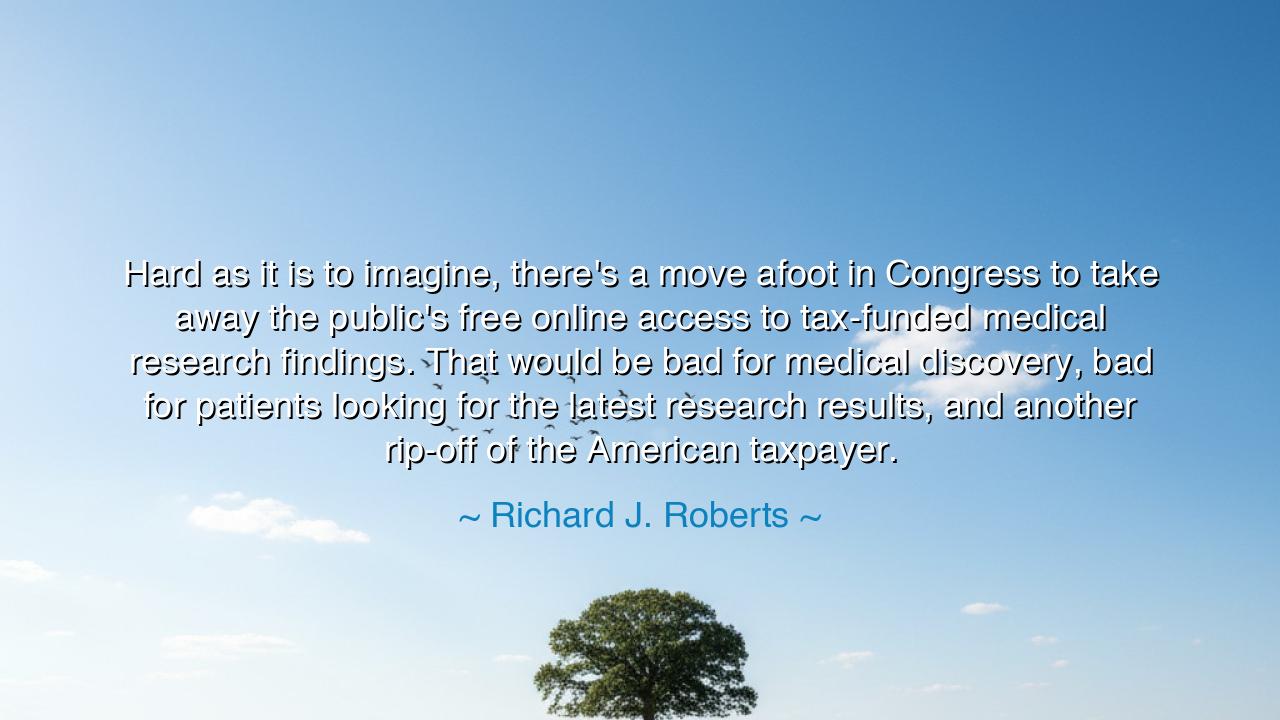
Hard as it is to imagine, there's a move afoot in Congress to
Hard as it is to imagine, there's a move afoot in Congress to take away the public's free online access to tax-funded medical research findings. That would be bad for medical discovery, bad for patients looking for the latest research results, and another rip-off of the American taxpayer.






The words of Richard J. Roberts—“Hard as it is to imagine, there’s a move afoot in Congress to take away the public’s free online access to tax-funded medical research findings. That would be bad for medical discovery, bad for patients looking for the latest research results, and another rip-off of the American taxpayer.”—burn with righteous indignation and moral clarity. Here speaks not only a scientist, but a guardian of truth, one who knows that knowledge born of public labor must not be chained and hidden, but shared openly for the healing of all. His words strike at the heart of justice: if the people have paid for discovery with their treasure, should they not also drink from its fountain?
At the center of his cry is the question of access. Knowledge, especially medical research, is no idle treasure to be hoarded. It is a tool of healing, a light in the darkness of disease, a weapon against suffering. To hide it behind barriers of profit is to deny the sick their hope, the healer their wisdom, and the taxpayer their rightful return. Roberts warns that such an act is not merely unwise, but unjust: it is to rob the very people whose labor and money made the discovery possible.
The ancients knew the peril of hoarded knowledge. In the myth of Prometheus, fire was kept from mankind by the gods, until the titan stole it and gave it to mortals, granting them progress and survival. In the same way, Roberts calls for the fire of modern knowledge to remain free, not locked away by the selfish few. For what is research, if not the fire of our age? What is science, if not the Promethean gift, meant to lift humanity out of darkness and pain? To restrict it is to act like Zeus, jealous and fearful, hoarding what was meant to save.
History, too, offers its lessons. In the Middle Ages, when books and learning were locked away in Latin and reserved for the clergy, the common people perished in ignorance, their diseases misunderstood, their lives cut short. It was only when the printing press broke the chains of access, and knowledge spread to all, that science, medicine, and progress leapt forward. Roberts’ warning is thus not new—it is the echo of history reminding us that whenever knowledge is chained, humanity suffers, and whenever it is freed, humanity advances.
The emotional weight of this teaching lies in its urgency. Roberts does not speak of inconvenience, but of life and death. To deny patients the chance to read, to learn, to understand the latest cures and treatments, is to condemn many to needless suffering. To deny researchers free access to one another’s findings is to slow the pace of discovery, delaying the healing of millions. And to deny the taxpayer what they have already paid for is to betray the trust upon which society rests. His words reveal that this is not merely a question of policy, but of morality.
The lesson for us is clear: knowledge must be free when it is bought by the people. Just as clean water flows to all, and just as the sun shines without cost, so too should publicly funded discoveries be open to every citizen. Practically, this means defending open-access policies, supporting institutions that share research freely, and holding leaders accountable when they try to place profit above public good. It means remembering that every barrier placed before knowledge is a barrier placed before healing.
Thus, Richard J. Roberts’ words are a clarion call to this generation and those to come: guard the freedom of knowledge, especially in medicine, for in it lies the salvation of the many. Do not allow arrogance or greed to build walls where there should be windows. For the true measure of a people is not in how much knowledge they possess, but in how generously they share it. Let this be the teaching handed down: that the fruits of discovery belong not to the few, but to the many, for only then will discovery fulfill its highest purpose—healing the world.






AAdministratorAdministrator
Welcome, honored guests. Please leave a comment, we will respond soon